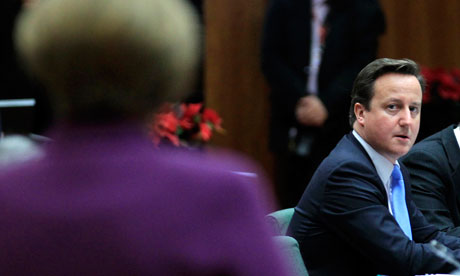It is certainty that we need to worry about, as extreme ideologies prosper in these uncertain times

Who knows if David Cameron's refusal to sign the EU treaty is a good thing or not. Photograph: Yves Herman/Reuters
I don't know what I am talking about. And, quite frankly, you should be relieved that I know that I don't know. The world is full of people proclaiming about stuff they don't know much about. My trade depends on it. Pundits, politicians and economists, too, all depend on some kind of bladder-busting meta-analysis to keep us quiet. In fact, they are just winging it.
Too many nights I have watched economists on television being treated with undeserved reverence. "Economics is largely a made-up pseudo-science!" I want to scream. After all, it has been almost entirely useless in predicting the mess we are in. Indeed, by coming up with grotesque calculations whereby rich people's investments were effectively risk-free and financed by the jobs and homes of the poor, many economists were cheerleaders pre-crisis.
This is not another anti-bank rant. It is now self-evident that banks did some bad stuff, but the diplomatic immunity they were granted was not merely political. Anyone who makes out that they know what they are doing and can turn a fast buck and believes, yes really believes, in something – anything, themselves even – is facilitated by society. And, yes, this is usually backed up by a narrative of questionable facts.
What is valued is certainty. What is devalued in such a world is uncertainty. Those who aren't sure are weak. Poor. Faithless. Uncertainty is often worrying and feminised. Real men know real things. So they have been lining up to tell us that David Cameron's refusal to sign the EU treaty is the best thing ever to have happened, or the worst thing ever to have happened, when, actually, no one is quite sure. Reconciling a belief in the democratic process with the recognition that the euro is still in big trouble and Greece may well go anyway, means it is impossible to line up clearly in the Eurosceptic versus Europhile shadow boxing. It is up in the air.
As this year has been a news tsunami, it would be far more interesting to acknowledge what we did not know rather than what we did. Most experts did not predict the riots, the Arab spring, the extent of the economic meltdown. I recall meeting a learned professor in Tel Aviv three years ago who explained that Iran not Egypt was now the centre of the Arab world and everything would start there. Like many others, I thought recession would produce some kind of resistance but had no idea how that would manifest itself. As for the financial crisis, our lack of foresight is mind-boggling.
But in public, and especially in politics, an admission of uncertainty is seen as problematic. At a dinner I attended a few years ago, a young politician was asked a question to which he had no answer. He said: "I don't know about that; I will go away and find out." It was Ed Miliband as it happens, and I was impressed. But the guys I was with crowed: "We got him there!" This relentless reduction of politics to point-scoring, this public-school obsession with certainty, is a turn-off. Look where it leads. Not so long ago, George W Bush said that if America "shows uncertainty and weakness in this decade, the world will drift towards tragedy. This will not happen on my watch." Apart from war, this "certainty" helped to produce the debt crisis.
It is certainty that we need to worry about, as extreme ideologies prosper in these uncertain times. Yet there have always been ways of thinking that properly refute certainty. The school of "weak thought" coming out of Italy via Gianni Vattimo follows a clear line from Nietzsche onwards that pushes against finality, and urges us to understand historical circumstance. "There are no facts, only interpretations and this too is an interpretation," Vattimo has said.
The work of Nassim Taleb also confronts us with the idea that the economic models used by the banks were based on the idea of stability. The ecology of the banking system could not predict risk properly at all (although Taleb did, actually). Then we have a genius such as Zygmunt Bauman, who has long been telling us that we live in "liquid modernity", that individuals can no longer plan careers and progress in linear, certain ways. Yes, it is like the weather: changeable.
Of course those who most understand the value of uncertainty are scientists themselves. As the delightful Jon Butterworth wrote this week, science has nothing to fear from uncertainty. The sexy little Higgs Boson particle, which may have flashed up in the data in Cern (I imagine it as a burlesque sort of particle) has meant we have listened to physicists telling us very excitedly about how much we just don't know.
This has been wonderful. The opposite of political discourse: to hear clever people talking about the limits of their own knowledge. How weighed down is public life with its emphasis on certainty. How dumbed down is belief. The big divides are not between different beliefs, but the differing degree of certitude in which those beliefs are held.
No one knows. No one has the answers. Uncertainty is where we are. It is to be embraced. Christopher Hitchens, when asked which word he had most overused, said he was shocked to find on rereading his work that it was "perhaps".
I love that. Perhaps, right now, is the best word. I'm sure of that. Perhaps.

No comments:
Post a Comment